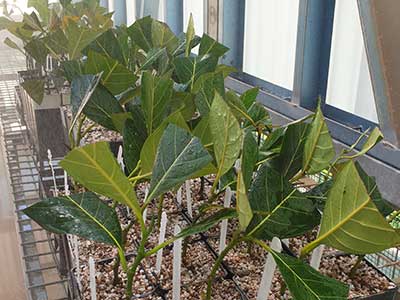Demonstrating next-gen resilient orchard production systems for tropical crops
The Cooperative Research Centre for Developing Northern Australia (CRCNA) has recently contracted the Queensland Department of Agriculture and Fisheries (DAF) to lead a three-year project investigating the use of both high-density plantings and trellis systems to examine their suitability for tropical fruit production in northern Australia. These strategies could provide growers with a production system that mitigates the risks associated with tropical cyclones, enabling expansion of the horticultural sector and economic development through new plantings across north Australia.
DAF’s project partners include the Northern Territory’s Department of Industry, Tourism and Trade, Northern Territory Farmers Association, Western Australia’s (WA) Department of Primary Industries and Regional Development, and Growcom in Queensland (Qld). Commercial horticulture partners include Manbulloo, with trial sites in the dry tropics near Townsville, the Atherton Tablelands, and Katherine, and Aus-Ex Fruit on the wet tropical coast of Queensland.
This project will demonstrate to growers the numerous benefits associated with high-density plantings. The model crop chosen for the project is jackfruit (Artocarpus heterophyllus). Jackfruit is a versatile and productive tree crop that is highly suited to production across a range of climatic zones in northern Australia. Jackfruit can be consumed immature (green) as a vegetable or as fresh ripe fruit. Fruit consumption as a vegetable is increasingly being embraced as a meat replacement for vegetarian and vegan consumers who are seeking new eating experiences and showing preferences for meat-free, ecologically friendly and sustainable consumption patterns.
The project is a demonstration of the next generation of orchard production technology proposed for northern Australian tropical fruit producers to increase annual productivity and profitability while managing cyclone risks. The key objectives of the project are to demonstrate the management and productivity benefits associated with high-density and trellised plantings for cyclone resilience, while simultaneously evaluating the commercial suitability of new jackfruit selections and propagation methods at multiple sites across northern Australia.
While this project is using jackfruit as the model crop, the high-density planting approach can be modified and used for the majority of tropical fruit crops that can be grown in northern Australia. The current three and a half-year-old high-density trellised cocoa planting at DAF’s Centre for Wet Tropical Agriculture, funded by the Australian Centre for International Agricultural Research will be included in the project.
Trial and demonstration sites will be in Carnarvon and Kununurra in WA, Darwin and Katherine in the Territory, and Bellenden Ker, Atherton, Mutchilba and Townsville Qld. Each demonstration site will use a mixture of seedlings, grafted trees and vegetatively propagated (cuttings / marcotts) trees planted to evaluate the selected varieties for commercial production.
Tree propagation methodology and data on tree growth rates, fertiliser and irrigation inputs, pest and disease issues, canopy development, flowering and harvest dates, yield and fruit aril (flesh) recovery will be collected. Various economic assessments and guidance materials will be developed to aid potential growers to adopt the demonstrated next-generation resilient orchard production systems.
The project will be a mix of applied research and grower extension with demonstration sites in key climatic zones in northern Australia, which are Carnarvon, Kununurra, Darwin, Katherine, Mutchilba, Townsville and Bellenden Ker.

More information
Go to the CRCNA website.
For further details on the trial, contact the Plant Industries team leader by email chelsea.moore@nt.gov.au.
